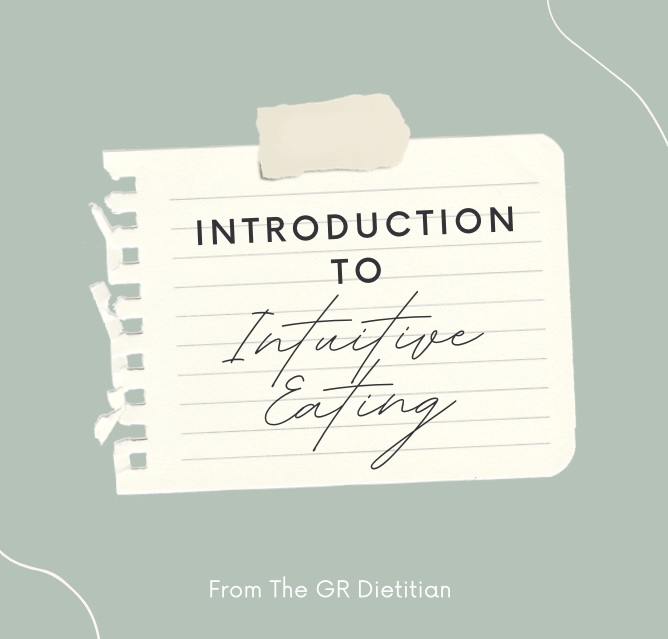
As I’m working on rolling out my Intuitive Eating group program next month, I’ve been getting a lot of questions about what intuitive eating is. If you’re curious about this concept, read on! This article provides an introduction to the topic as well as some resources to get you started.
What is Intuitive Eating?
Intuitive eating is an evidence-based approach to sustainable habits that support a healthy relationship with food.
It was developed over two decades ago by two dietitians, Evelyn Tribole and Elyse Resch. They define it as “a dynamic mind-body integration of instinct, emotion, and rational thought.”
Put simply, intuitive eating can be compared to how a toddler would eat before they start learning food rules. Babies and toddlers eat intuitively. But as humans grow up, our food choices are influenced by so many things, like family and cultural food choices, socioeconomic status, social media, and more.
Intuitive Eating is NOT a Diet
In contrast, intuitive eating strives to go against dieting. It’s an anti-diet.
It’s important to remember that a person’s food choices affect their entire health, including their mental health. Strict and unnecessary dieting rules that serve the main purpose of altering a person’s body shape can be very mentally taxing. Extensive research shows that dieting can contribute to a number of psychological and metabolic health consequences.
Negative Effects of Dieting:
- Increased binge eating
- Preoccupation with food and body image
- Increased feelings of failure and guilt
- Hormone disturbances
- Lower self-esteem
- Weight cycling (weight ups and downs, or “yo-yo” effect)
- Increased risk of developing disordered eating or eating disorders
See also: Fad Diets: Why We Need to Ditch Them for Good
Benefits of Intuitive Eating
Intuitive eating is a more compassionate approach to eating. It aims to influence positive psychological and physical well being. It is rooted in offering dignity and respect for all bodies, and is now aligned with Health at Every Size (HAES).
See also: What is Health At Every Size?
Over 150 peer-reviewed studies completed since the 1990s show extensive benefits that can come from eating intuitively.
Positive Effects of Intuitive Eating:
- Increased self-esteem and sense of wellbeing
- Reduced episodes of binge eating and disordered eating
- Improved lipid and blood glucose levels
- Decreased blood pressure
- Better reliance on internal hunger and satiety cues
- Greater variety of food choices at meals
- Higher intake of fruits and vegetables regularly
- More enjoyment of eating
- Greater body appreciation and trust
- Improved coping skills
Framework for Intuitive Eating
There are 10 principles that form the base of eating intuitively. They are meant to be a guide, and they don’t need to be followed in a specific order. Here are the principles, direct from the founders:
Principle 1: Reject the Diet Mentality.
Throw out the diet books and magazine articles that offer you false hope of losing weight quickly, easily, and permanently. Get angry at the lies that have led you to feel as if you were a failure every time a new diet stopped working and you gained back all of the weight. If you allow even one small hope to linger that a new and better diet might be lurking around the corner, it will prevent you from being free to rediscover Intuitive Eating.
Principle 2: Honor Your Hunger.
Keep your body biologically fed with adequate energy and carbohydrates. Otherwise you can trigger a primal drive to overeat. Once you reach the moment of excessive hunger, all intentions of moderate, conscious eating are fleeting and irrelevant. Learning to honor this first biological signal sets the stage for re-building trust with yourself and food.
Principle 3: Make Peace with Food.
Call a truce, stop the food fight! Give yourself unconditional permission to eat. If you tell yourself that you can’t or shouldn’t have a particular food, it can lead to intense feelings of deprivation that build into uncontrollable cravings and, often, bingeing When you finally “give-in” to your forbidden food, eating will be experienced with such intensity, it usually results in Last Supper overeating, and overwhelming guilt.
Principle 4: Challenge the Food Police.
Scream a loud “NO” to thoughts in your head that declare you’re “good” for eating under 1000 calories or “bad” because you ate a piece of chocolate cake. The Food Police monitor the unreasonable rules that dieting has created . The police station is housed deep in your psyche, and its loud speaker shouts negative barbs, hopeless phrases, and guilt-provoking indictments. Chasing the Food Police away is a critical step in returning to Intuitive Eating.
Principle 5: Respect Your Fullness.
Listen for the body signals that tell you that you are no longer hungry. Observe the signs that show that you’re comfortably full. Pause in the middle of a meal or food and ask yourself how the food tastes, and what is your current fullness level?
Principle 6: Discover the Satisfaction Factor.
In our fury to be thin and healthy, we often overlook one of the most basic gifts of existence–the pleasure and satisfaction that can be found in the eating experience. When you eat what you really want, in an environment that is inviting and conducive, the pleasure you derive will be a powerful force in helping you feel satisfied and content. By providing this experience for yourself, you will find that it takes much less food to decide you’ve had “enough”.
Principle 7: Honor Your Feelings Without Using Food.
Find ways to comfort, nurture, distract, and resolve your issues without using food. Anxiety, loneliness, boredom, anger are emotions we all experience throughout life. Each has its own trigger, and each has its own appeasement. Food won’t fix any of these feelings. It may comfort for the short term, distract from the pain, or even numb you into a food hangover. But food won’t solve the problem. If anything, eating for an emotional hunger will only make you feel worse in the long run. You’ll ultimately have to deal with the source of the emotion, as well as the discomfort of overeating.
Principle 8. Respect Your Body.
Accept your genetic blueprint. Just as a person with a shoe size of eight would not expect to realistically squeeze into a size six, it is equally as futile (and uncomfortable) to have the same expectation with body size. But mostly, respect your body, so you can feel better about who you are. It’s hard to reject the diet mentality if you are unrealistic and overly critical about your body shape.
Principle 9: Exercise–Feel the Difference.
Forget militant exercise. Just get active and feel the difference. Shift your focus to how it feels to move your body, rather than the calorie burning effect of exercise. If you focus on how you feel from working out, such as energized, it can make the difference between rolling out of bed for a brisk morning walk or hitting the snooze alarm. If when you wake up, your only goal is to lose weight, it’s usually not a motivating factor in that moment of time.
Principle 10: Honor Your Health with Gentle Nutrition.
Make food choices that honor your health and tastebuds while making you feel well. Remember that you don’t have to eat a perfect diet to be healthy. You will not suddenly get a nutrient deficiency or gain weight from one snack, one meal, or one day of eating. It’s what you eat consistently over time that matters. Progress, not perfection, is what counts!
Want more resources or support?
- Start by buying the book or workbook by Evelyn Tribole, RDN and Elyse Resch, RDN, linked here.
- Some of my favorite anti-diet podcasts are: Motivation Made Easy, Food Psych, and What the Actual Fork.
- Work with a registered dietitian specializing in intuitive eating. I currently see clients in my office in Grand Rapids, MI or virtually. You can visit a link to my services page here.
- Join my 8-week intuitive eating group program, beginning next month! Apply by contacting me here.



